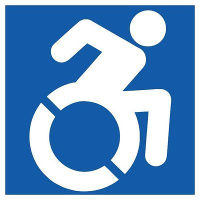Judgment Withheld
 Recently I had a revelation. My wife was doing a pharmacy internship for a month at a downtown hospital. Because it's downtown, parking is tight, so most of the hospital staff is required to park at a remote parking garage and take a 20 minute shuttle ride to the hospital proper (I assume surgeons and high-ranking doctors are exempt from riding with the commoners). However, my wife gets terrible motion sickness if she's not the one driving. Not "I feel yucky", but nausea so severe it induces a panic attack and reduces her to a puddle on the floor, shaking and shivering for hours.
Recently I had a revelation. My wife was doing a pharmacy internship for a month at a downtown hospital. Because it's downtown, parking is tight, so most of the hospital staff is required to park at a remote parking garage and take a 20 minute shuttle ride to the hospital proper (I assume surgeons and high-ranking doctors are exempt from riding with the commoners). However, my wife gets terrible motion sickness if she's not the one driving. Not "I feel yucky", but nausea so severe it induces a panic attack and reduces her to a puddle on the floor, shaking and shivering for hours.
So, she asked how to get an exemption. Basically, she had to get a handicap placard and then she could park in the hospital parking lot and avoid the shuttle. So she did.
This was a revelation for me, because I had always gotten angry when I saw some young, seemingly able-bodied person park in a handicap spot, hang up their handicap placard, and bound sprightly out of the car into wherever they were going.
It infuriated me, because, in my mind, a person who needed handicap parking would have an obvious reason for parking there. They'd be old, or in a wheelchair, or on crutches, or use a cane, or be moving in a way that made it obvious they had some sort of problem. But here's my physically fit wife, needing to park in handicap spot with no externally-obvious disability.
She needed it because otherwise she'd not be able to do her job. Without the placard, she'd certainly not be able to complete her internship. Without the placard, her life would have fallen apart when she lost 2 or 3 hours of every day to severe, crippling nausea and panic attacks.
So maybe those other people I saw also had some non-obvious but valid reason for needing a handicap placard? It wouldn't necessarily be the same reason as my wife's, but something else? I'd have never guessed my wife's reason for needing it, and probably not have believed it if someone else told me, or at least thought they were exaggerating. I mean really: "You need a handicap spot because you get 'car sick'!? Yeah right. Try being wheelchair-bound, then you'd see who needs a spot!"
But knowing how terribly severe my wife's motion sickness is, I have no problem believing she absolutely needed a handicap spot to do her job.
So now, I just chill when I see some seemingly able-bodied person "abusing" the handicap placard. Not that I actually confronted any of them before (I'm not that kind of guy), but now I don't even get mad.
But this applies to all kinds of things: many are disbelieving of other people's claims of disability. "You have PTSD from high school bullying?! I was bullied too, just get over it!" or "Oh, your back hurts, waah."
I'm sure many people know someone who's receiving disability money or workman's comp or similar. I'm sure 95% of people believe 95% of the disability claims are fraudulent. But unless you know the person extremely intimately, you might not know the real story. Most people wouldn't guess my wife gets so motion sick that she is immobilized. I know she does because I've seen it happen, and she is, you know, my wife. So maybe "Old Fakin' Joe" isn't faking it, either. Maybe his disability is just as unobvious and you'd never know or guess unless you lived with him.
Of course I'm not saying disability fraud doesn't exist, I'm only saying that you are almost certainly not in a position to make a judgment on the truthfulness of any particular claim, despite what you heard from your friend or what you think you know.
I bet, with little imagination, you can apply this to a lot of situations. Are you judging someone on something that's none of your business? Are you judging someone when you almost definitely lack full knowledge? Maybe you don't need to come to any conclusion?
Obviously, if a person is possibly endangering you or endangering other people you need to form some opinion and act on it, but short of that, give people the benefit of the doubt.

Comments
Add comment